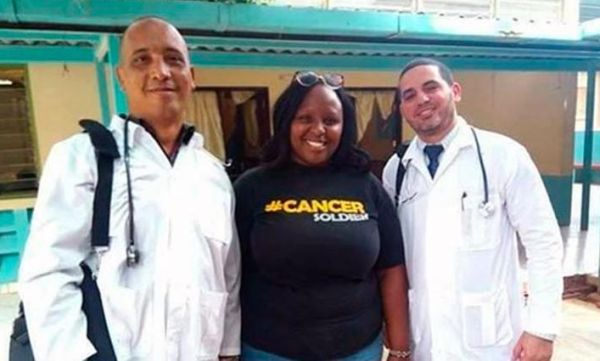
The kidnapping of Cuban doctors Assel Herrera and Landy Rodríguez, which occurred on April 12 in a far away location in the county of Mandera, Kenya, raises waves of solidarity on both sides of the Atlantic
It was nine o’clock in the morning, April 12, in Banisa, a dusty village in the Mandera County, Kenya. At that time Assel Herrera and Landy Rodríguez, two Cuban doctors who had been working there since last June, were on their way to work.
But, just in a few minutes, their life was turned upside down. The ambush, the shots and Katambo, the young officer who served as bodyguard, also shooting and dying in the street.
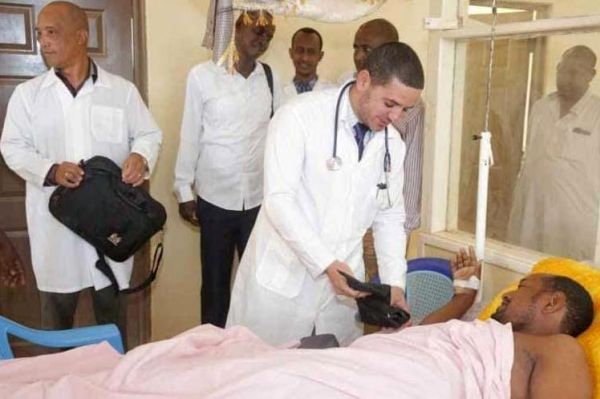
It was the last time Assel and Landy were seen, in the middle of the shooting and led by their captors. They both disappeared inside a car that went off like a shot across the border into Somalia.
ABOUT THE DOCTORS
Rosalía Herrera Furrozola saw them in the news that morning on Citizen TV, one of the television channels in Kenya. The face of her colleagues appeared again and again with the incredible announcement that they had been abducted. The news was confirmed on the telephone by Damodar Peña, head of the Cuban medical mission in Kenya. It was not media manipulation. It was a kidnapping.
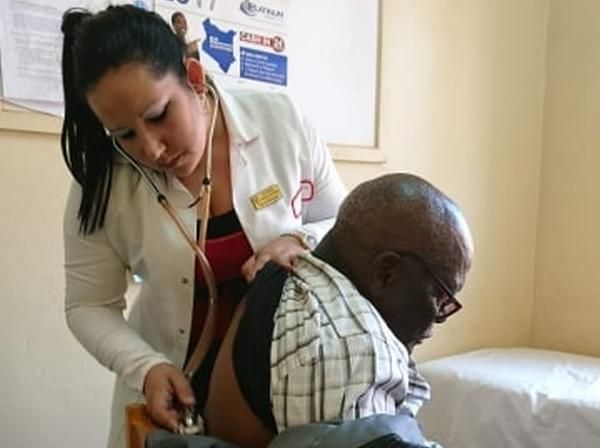
She had met Assel and Landy months ago when they were all attending an English course in Cuba. They met again in the hundred-group of doctors who arrived in Kenya in June, 2018. She was the only doctor (nephrologist) from the central Cuban province of Sancti Spiritus to be assigned to the level-5-reference hospital of Embu, a city in the center of Kenya. Assel and Landy would go to Mandera, near the Somali border.
“I have not stopped working, says Rosalia. We are scared and very worried, but here in the Government hotel, where we live, and in the hospital, we have good security. We also have a driver and a car to go to and from the hospital”.
Rosalia works together with a woman neurologist from the Cuban eastern province of Camagüey. They are the only Cubans in that governmental health center, where people are supposed to pay for everything, where Swahili and English are the only languages spoken, where there had never been a nephrologist before, and where many people are being saved today.
More than a hundred patients are treated there every week either in dialysis service, the Intensive Care Unit, the maternity clinic or the pediatric wards.
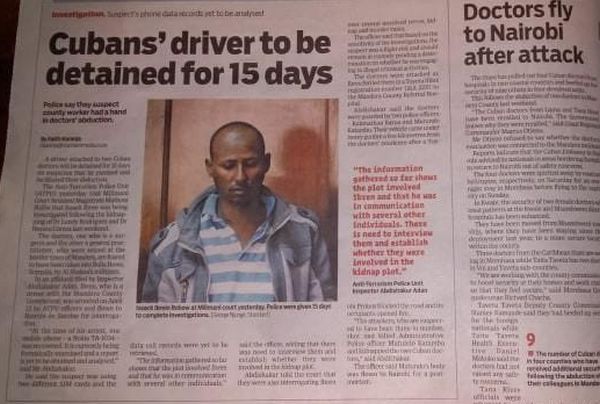
ABOUT THE KIDNAPPING
That same morning of April 12, the police made a security alert and Ali Roba, the governor of Mandera, made a statement to The Star, a local media, calling on the security agencies to do whatever was necessary to save the lives of the Cuban doctors and to return them from captivity. He also sent his condolences to the family of the deceased officer.
The kidnappers were supposed to belong to Al Shabaab —a terrorist organization linked to Al Qaeda that had already perpetrated similar abductions in Kenya— and presumably the Cuban doctors had been taken to Somalia.
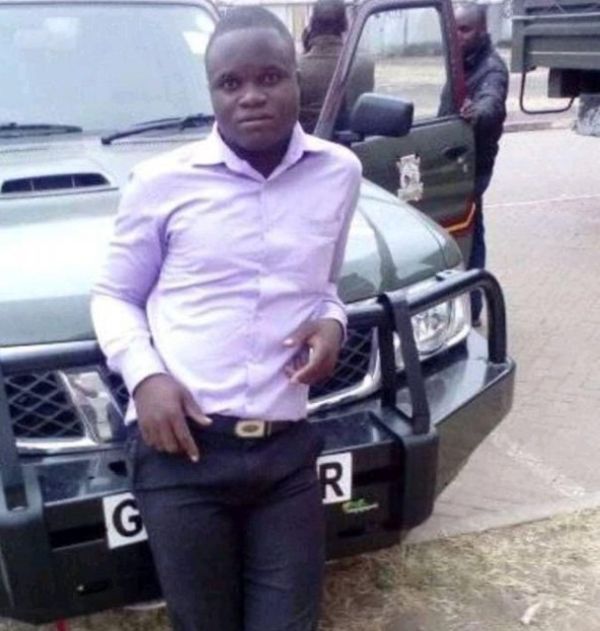
That same day the council of elders of Mandera also crossed the border to negotiate with their counterparts: the community representatives of Beled Hawo. A hopeful news transcended from the negotiations: the victims were alive and were being moved from one place to another.
The note then issued by the Ministry of Public Health of Cuba attested to communication channels established with the Kenyan authorities, the timely information to the doctors’ relatives, and the creation of a government working group to follow up on “such a sensitive issue”.
As the actions of tracking by land were reinforced and the helicopters began to cross the sky more than once, another rescue began to spread: that of solidarity.
Miguel Díaz-Canel Bermúdez, president of the Cuban Councils of State and Ministers wrote on Twitter:
#Cuba se esfuerza sin descanso por el retorno a salvo de Assel y Landy, nuestros médicos secuestrados en Kenya. Con ellos y sus seres queridos compartimos la certeza de que su misión humanitaria será respetada y reconocida. Creemos en el poder de la Solidaridad #SomosCuba pic.twitter.com/2XVNgyDeDA
— Miguel Díaz-Canel Bermúdez (@DiazCanelB) April 14, 2019
Likewise, Cuban Foreign Minister, Bruno Rodríguez Parrilla, and José Ángel Portal Miranda, minister of health, informed about their constant communication with their Kenyan counterparts.
Other Cuban vicepresidents and ministers also expressed their support, and even Dr. Tedros Adhanom Gebreyesus, director general of the World Health Organization (WHO), felt sorry for the kidnapping of the doctors.
Meanwhile, in Kenya, other measures were adopted: nearly ten Cuban doctors working in Lamu, Garissa and Wajir were transferred to Nairobi.
ABOUT HOPES
Everyone holds on to these certainties. At this time, they are the most encouraging news, perhaps, for Landy’s mother, Martha Hernández, or Ada Correa and Antonio Herrera, Assel’s parents.
When the journalists visited them in their homes —in Placetas, Villa Clara, and in Delicias, Las Tunas, respectively— they all agreed to accept that their children will be safe.
Rosalía also agrees. During her ten month stay in Kenya, she has shared a lot of experiences with her colleagues: the endless lines waiting for each consultation, the hugs of patients as a sign of gratitude, the pain for the death of a child whose family does not have a enough to pay for expensive treatments, the reward of those who are saved.
For her, as well as for Assel and Landy who talked on the subject during an interview to Citizen TV months ago, it has also been difficult to get used to so many dialects.
According to Rosalia, patients want the Cuban doctors to stay in Kenya because they wonder what would happen to them once they leave. They have even expressed their solidarity towards the kidnapping situation and are very interested to know about what is happening. Several images have been published showing people carrying posters on their chests demanding the return of their doctors.
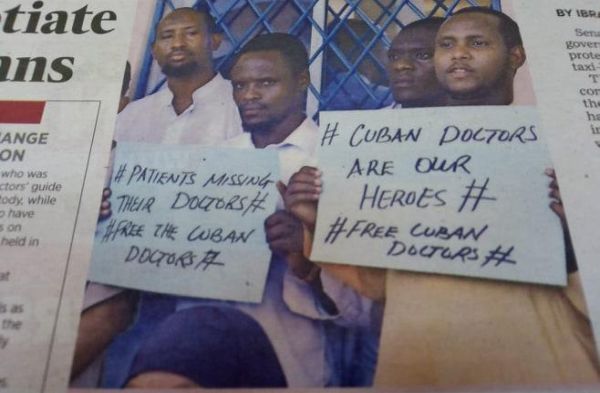
On the other side of the world, all that support is highly appreciated. Meanwhile, many prefer to think of Landy and Assel in the way they look in the photos. On this side of the world, hope is becoming a daily encouragement, that which foresees the most expected return.
 Escambray ENGLISH EDITION
Escambray ENGLISH EDITION





Escambray reserves the right to publish comments.